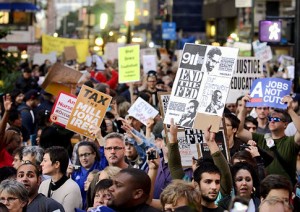 “No matter your thoughts about the Occupy Wall Street movement, the protesters were right in at least one respect: The rich are getting richer, and the poor are getting poorer.”
“No matter your thoughts about the Occupy Wall Street movement, the protesters were right in at least one respect: The rich are getting richer, and the poor are getting poorer.”
Variations on this statement were repeated in dozens of blogs, commentaries, and even news reports in the past months. The claim comes via a Congressional Budget Office analysis that shows incomes for the top 1 percent of Americans growing by 275 percent between 1979 and 2007, while the lowest 20 percent saw their inflation-adjusted incomes grow by “only” 18 percent.
The numbers from the report are correct, but the assertions based on it are true only because of careful wording. While the “top 1 percent” had the highest growth of income, if broadened to include the top 20 percent (the usual way of analyzing such figures), the growth rate was a far less stratospheric 65 percent. This contrasts with about 40-percent growth for the middle three-fifths of all wage earners, and 18 percent for the lowest one-fifth.
Statistically, the lowest 20 percent of households are poor for one main reason: They don’t work as much. Among the causes are medical issues, disability, and bad incentives. Not surprisingly, households in the top 20 percent are far more likely to include people with jobs. Here’s how professor Mark Perry, a member of the Mackinac Center’s Board of Scholars and chairman of the economics department at the University of Michigan-Flint, described it:
American households in the top income quintile have almost five times more family members working on average than the lowest quintile, and … are far more likely … to be well-educated, married, and working full-time in their prime earning years. In contrast, individuals in low-income households are far more likely to be less-educated, working part-time, either very young or very old, and living in single-parent households.
More significantly, the “rich getting richer” storyline insinuates that the top 1 percent and bottom 20 percent include the same individuals over time. For example, as reporter Julie Mack writes, “Overall, the numbers show that the more affluent you are, the better you’ve done in the past three decades.” Note how this ignores the reality that many individuals who were in the poorest group years ago have long since moved up and out, while among the rich are many families who are literally nouveau riche—they’ve recently arrived from lower income levels.
That’s the risk of relegating real people into statistical categories. Economist Thomas Sowell explained it this way: “The actual empirical evidence cited has been about what has been happening over time to statistical categories turns out to be the direct opposite of what has happened over time to flesh-and-blood human beings, many of whom move from one category to another over time.”
Data that tracks real people show that Sowell is correct. For example, as reported in The Wall Street Journal, IRS tax-return data shows that individuals in the bottom one-fifth back in 1996 experienced income growth of 91 percent by 2005. In contrast, individuals in the highest one-fifth saw their incomes increase just 10 percent over the same period. Incomes of households in the top 5 percent and 1 percent actually declined, by 7 percent and 24 percent, respectively.
Anecdotally, this makes sense: For example, in 1985, my father was just out of college and probably in the lowest 20 percent. But by 2007 he had moved up. Such examples are commonplace, but are completely missed by statistical aggregates.
In the late 1970s, Steve Jobs was trying to expand a struggling computer company. Bill Gates was writing code and just beginning to start working on a personal computer. And one of the founders of Google, Sergey Brin, had just arrived as a six-year-old immigrant from the USSR. These are individuals who did not enter that top 1 percent until many years later—in the process displacing former “one percenters.”
It was these individuals, not statistical categories, who created companies and wealth by making products people wanted. Establishing conditions in which individuals can move up the income ladder by creating, innovating, and building is what America is all about.



